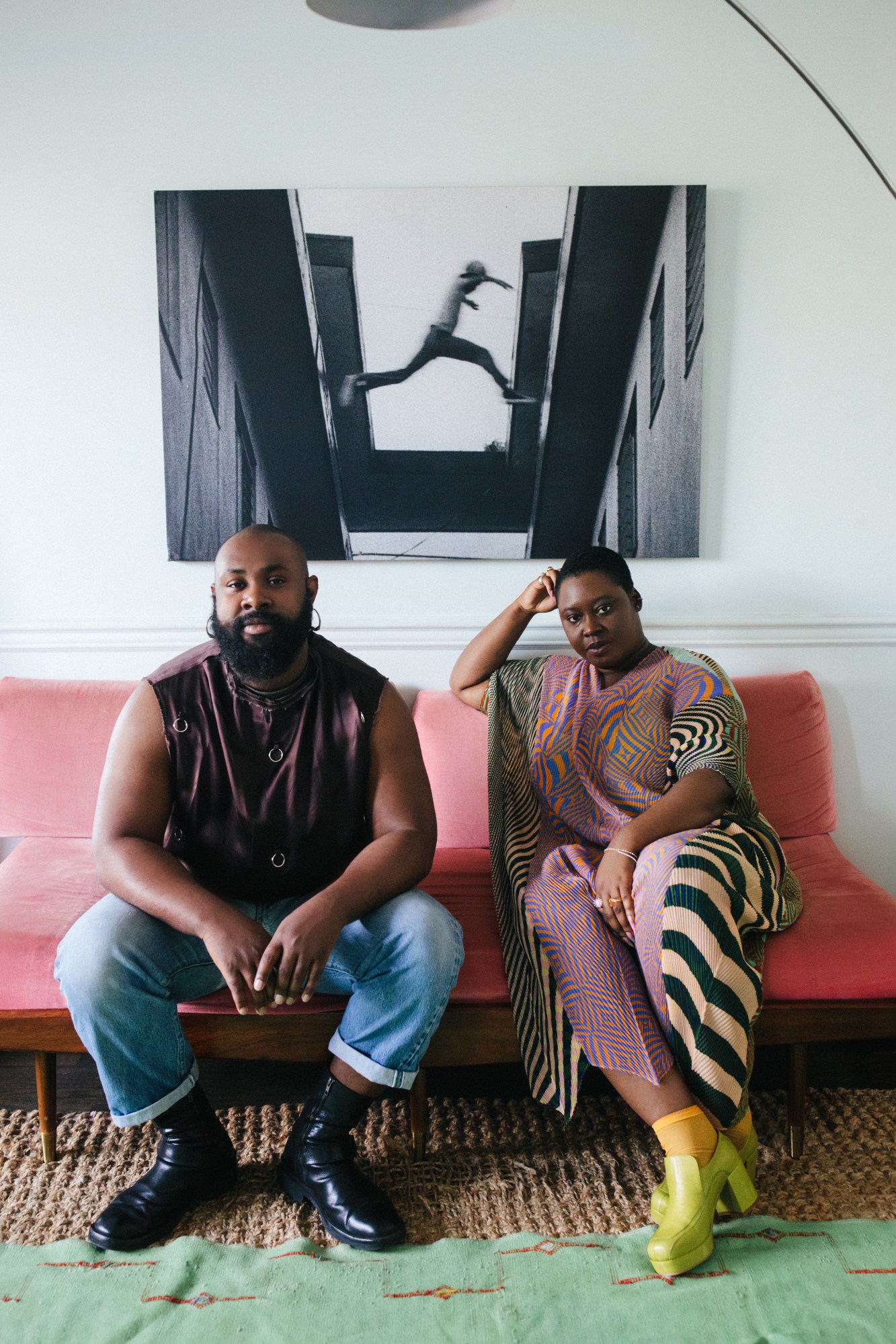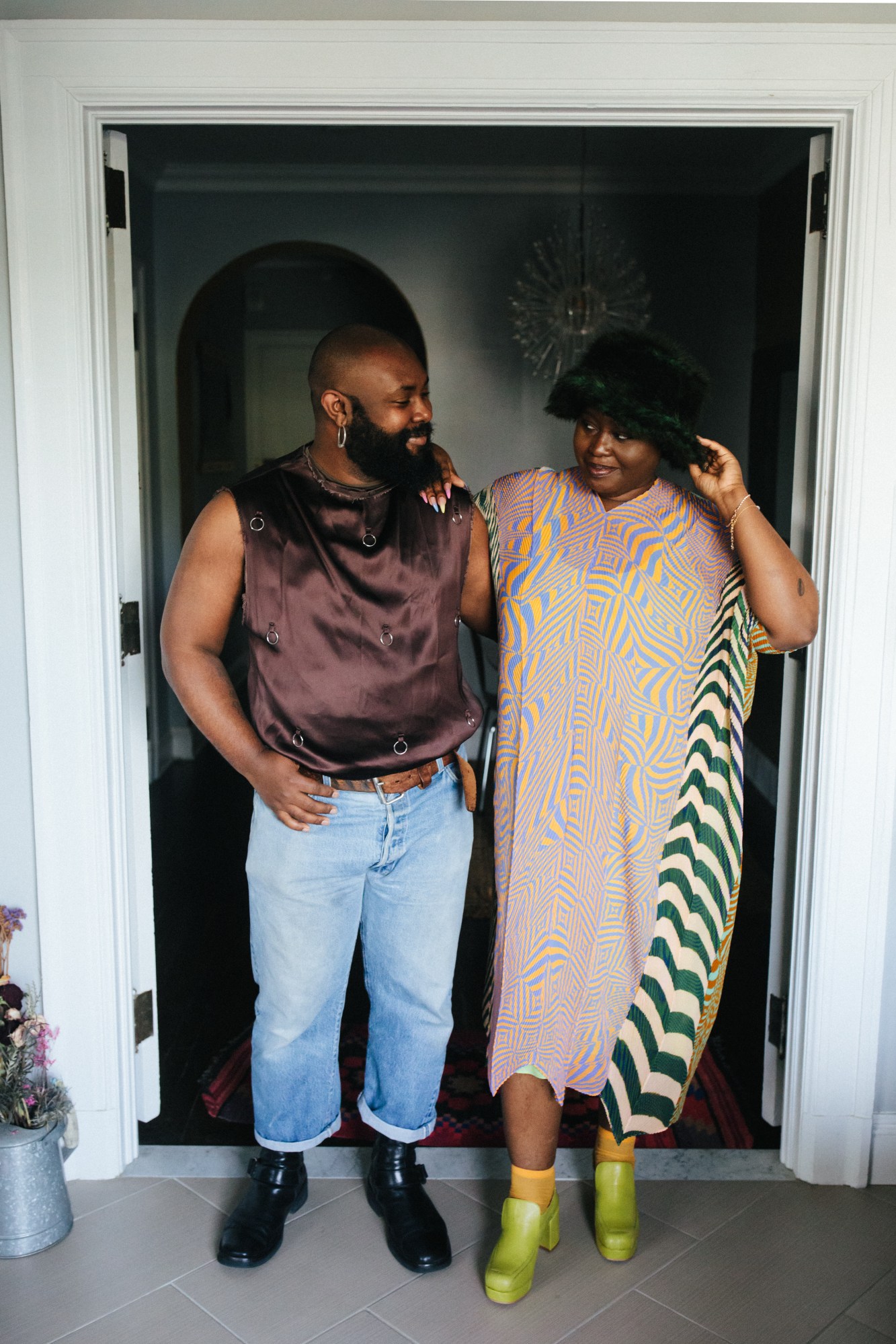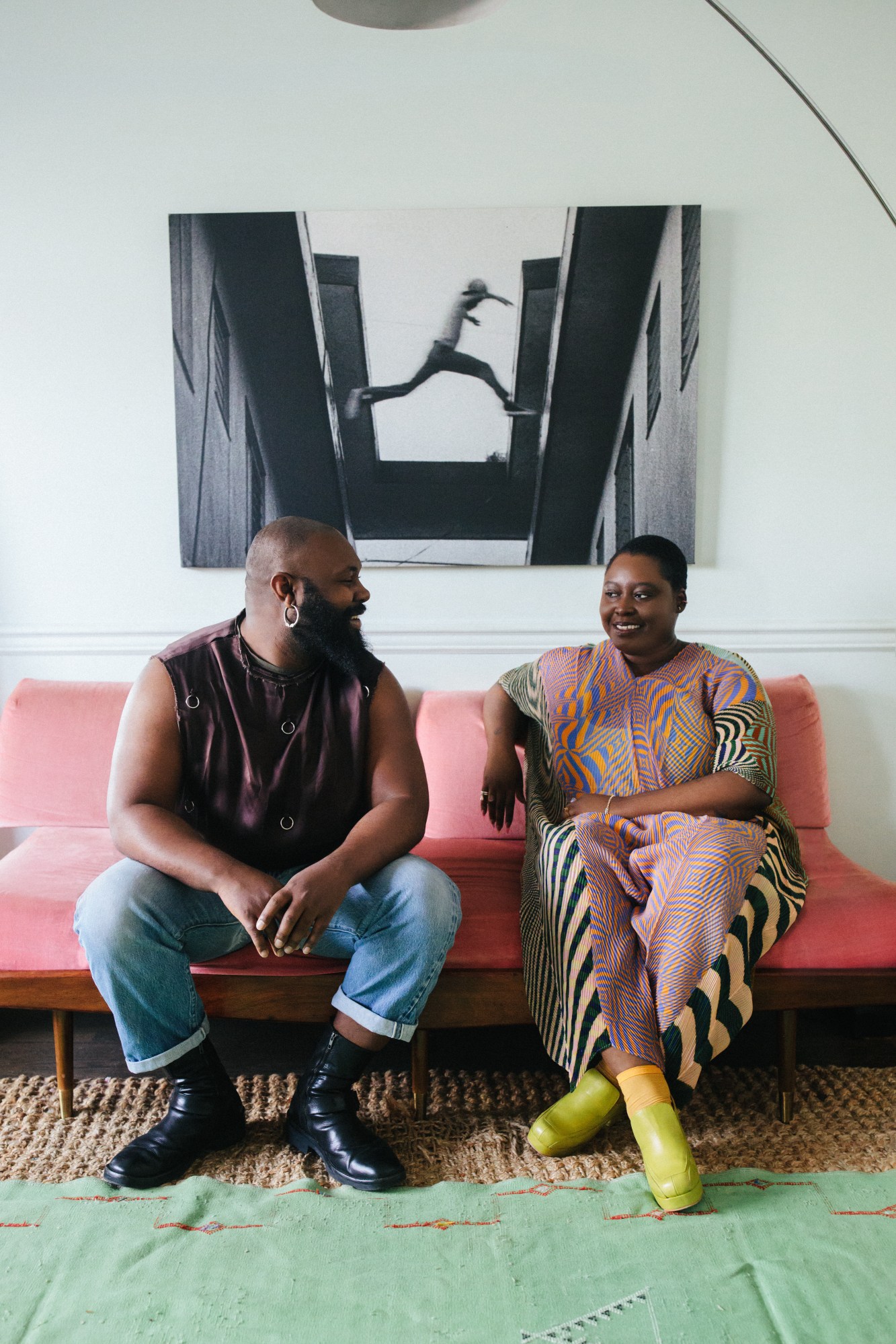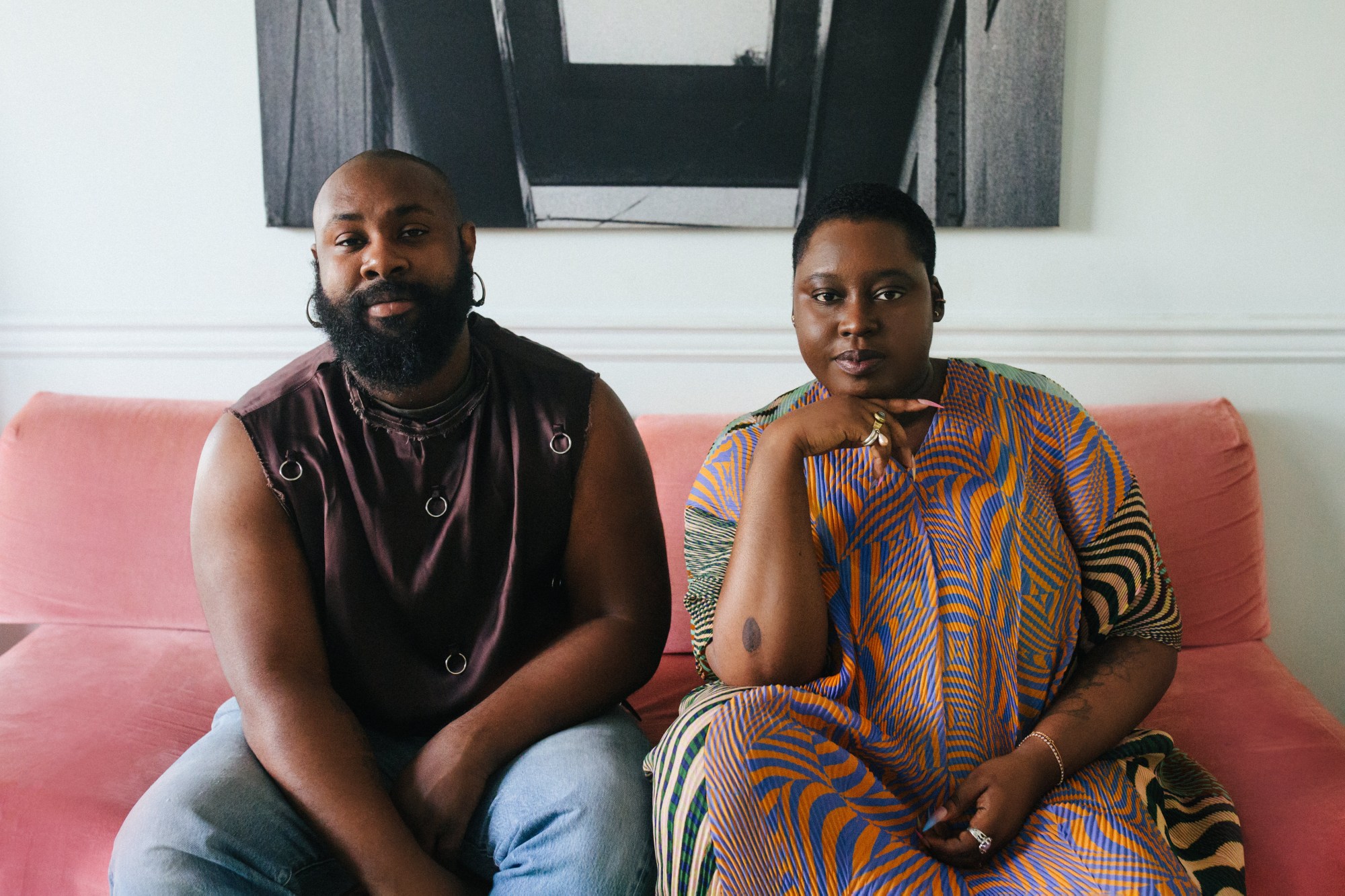“Healing Arts” is a series exploring self-love as a creative practice. In honor of #MentalHealthAwarenessMonth we asked four voices at the intersection of healing and creativity to share their stories each week in May.
Zeba Blay and Keesean Moore first crossed paths at their New Jersey high school. They were intrigued by one another, at first from afar. Keesean was outgoing, and known for his charm, while Zeba was more reserved— “uncharmable in a good way,” as Keesean puts it. Now in their thirties, they’ve matured into their respective crafts, with more than a few impressive achievements in tow. Zeba is a writer and critic polishing up a forthcoming book, Carefree Black Girls. Keesean is a poet and owner of the Moore Vintage Archive, a shoppable design library in Philadelphia that specializes in designer vintage, rare books and records. Their shared accomplishment is the framework they’ve cultivated for checking in on each other’s mental health, creating space for the raw truths of racial trauma, queer trauma and loneliness. This practice of opening up into radically honest conversation has been a lifeline in the turbulence of the past year.
In honor of #MentalHealthAwareness Month, Zeba and Moore reflect on the power of unconditional love, and how to connect with joy while holding the heaviness of anxiety and depression.

ZB: Maybe we can start just by talking about how we met.
KM: That’s cute, let’s do that. We met in high school. So much of it is kind of a blur, but the thing I do remember is meeting you and being intrigued by you. You seem very mysterious to me.
ZB: [Laughs] Whoa…
KM: And very smart. Not easily fooled. In high school I was trying to be very charming as a means of being liked. I was dealing with my own queerness in that regard. But you seemed uncharmable in a good way. I had to approach you with sincerity. I was drawn to that.
ZB: It’s funny, you’re not the first person who’s told me that about myself. I was never into playing the role of anything. I was able to have very good intuition about people. I felt that intuitive feeling towards you, which was that you were a really good person and that there was a lot more to you than being that charming person who was “on”.
KM: Yeah. I didn’t have to be quite as “on”. On as a means of protection, or as a means of navigating a different racial environment. It was my first time ever going to school with white people. So that required some adjusting of my adolescent brain.
ZB: Completely. It’s one thing to be aware of white people in a hypothetical sense. But then there is actually interacting with them day-to-day and having no roadmap. No one is telling you how to navigate something that is actually very fraught.
KM: The language around describing interactions in those spaces has developed and grown. I definitely didn’t really have any of the language to describe all that.
ZB: I think we definitely became much closer after high school. In our twenties. I remember one time we went to Central Park and just walked around all day. It got dark. Then we went to get food at the Whole Foods near Columbus Circle. We sat on a bench eating. And we were talking about what we would be like when we were 30. Do you remember this?
KM: I don’t necessarily remember all the conversation, but I’m really enjoying hearing you recount it.
ZB: That conversation was really beautiful because it showed me that as different as I thought we were, we actually have so much in common. It feels good when you’re able to talk to someone about something that makes you feel so alone and see that someone else feels it in the same way that you do. You know what I mean?
KM: I understand how rare it is to be able to just be with someone and without explanation. To talk freely without fear of being judged, even if the idea isn’t fully formed. I can explore with you. We’ve done so much exploring together.

ZB: Yes. It’s been really cool to see that evolution. Every time we talk, it’s definitely going to be a kiki, but it’s also going to be some fucking gems of wisdom. Being able to witness your growth also allows me in a way to witness my own. A lot of the time I feel as though my depression is never going to get any better and my anxiety is never going to get any better. But then I take a step back. Ten years ago, I wasn’t telling anybody about what I was going through.
KM: I remember telling you about certain depressive spells or anxiety that I was feeling. You know, family stuff and queer stuff. Sometimes you would be like, “Oh, I never thought that you…” You didn’t necessarily assume that I was also experiencing mental health challenges, issues, problems or things to stay on top of. It’s a day-to-day thing.
ZB: A word that came to me is relentlessness. Of staying on top of your mental health. You have to find practices and ways of, of dealing with that relentless relentlessness. As a writer, everything I write is about how sad I am.
KM: I feel that. Even in my poetry, it’s a moment for you to explore your own vulnerability. One of the most engaging things about your writing is that it seems to be coming from a very raw place. Not an erratic place, it’s a pragmatic rawness. Solution-driven. This is an issue, and you’re just writing through how to solve it.
ZB: Can we actually talk about that? How writing is a way of processing these things? We’re both writers, in very different genres, but there’s this thread. I’m deeply interested in your work. It’s another way of getting to know you.
KM: I’ve been writing poetry for as long as I can remember, but in my adult years, I started to take it a lot more seriously because it was a key to saving my life. The questions that I was and that I am still, exploring in my poetry and the answers that come out of it really shaped my consciousness. It’s a meditative space for me to just drop everything and let my mind kind of give me the answers. The best poems are poems that surprise the poet. If I’m not surprised by the discovery in the poem, then it’s not done yet. I approach the page to sort shit out. It’s definitely invaluable to me, sorting out really, really deep questions that come through my mental health journey. It’s a matter of putting language to an emotion.
You’re writing for me, the vulnerability in your writing, it allows me to be braver. You’re so brave in your writing. There are certain things that I would question about “do I even have the right to say this,” but you’re a fearless writer. I’m as invested in your work as you are in mine. I hope you know that.
ZB: Wow. Thank you. That means a lot because being a writer is probably one of the most, vulnerable places that you can put yourself in on so many different levels. I’ve often told you just about the doubts that I have around my abilities as a writer, and the fear that comes with that. It’s really cool to hear what writing is for you, because I love the idea of writing being a place you go for complicated emotions.
I started writing on live journal, at 15, 16. That was very much an angsty teenage outlet where I first sort of found the courage to be very open and honest about the darker sides of my mind.
KM: Have you kept them? Do you still have any of your old journals?
ZB: Oh yeah. I’m actually working on a project that’s going to be me in conversation with my live journals. I had a live journal from ages 15 to 21 or something like that. Now I’m 32. I go back and I read some of these entries and I’m like, “Wow, I have been so profoundly sad for such a long time.” It’s kind of the same emotions I feel today. I see them in that teenage Zeba. It’s the same trauma. I see it all. It’s really overwhelming, but it’s also beautiful. Writing has always been a way to challenge myself I guess, and not repress. Writing is where I confront myself.
KM: To speak so freely as a Black person about what you’re going through is in itself a monumental achievement. So much of the conditioning around the Black experience is around silence. It’s hard to speak truth because we have so much to sift through. So many voices that are going against what we know to be true.
ZB: Can we talk a little bit about that? This past summer, during the height of Covid with all these Black people dying, I remember us having a conversation about the black squares that was so cathartic for me.
KM: Those conversations gave meaning to a dizzying experience.
There was one time where I was just so overwhelmed that we stopped talking for a little bit. It wasn’t a falling out. It was just me not being able to vocalize something frustrating. You gave me the space to be like, “you can say these things to me, the love that I have for you will not be shaken by any of these things.” It unlocked a lot for me and my understanding of what unconditional love can be, especially growing up in a weird home. So much of my understanding of parental love was conditional. I felt like I had to be perfect so that I wouldn’t be abandoned. We really showed up for one another in a way that I feel really took our bond to another level.

ZB: I’ve learned so much from you about what it means to be a good friend. Being a good friend is not about perfection. If anything, it’s about the messiness. We’ve been made to feel like these things are messy when they’re just the reality of having a relationship with someone. When two people love each other, there is an agreement that has been made that says that you can say whatever loving thing that you need to say to me. I’m not going to take it any type of way, because I know that you love me. People start feeling a type of way when they don’t trust that the person they’re dealing with loves them.
KM: When it comes to speaking honestly, and openly, sometimes that can be just so difficult because, especially in America, truth is something that is seen as incendiary. Something to be avoided. Societal conditioning we’ve all undergone where we’re always constantly like, “Oh, is this oversharing, Oh, am I saying too much? How am I being perceived? Am I being difficult?” Micro-aggressive words. With you, I’m allowed to be completely ridiculous.
ZB: Yes! There is freedom in the silliness. There’s freedom in the sad moments, the dark moments.
I think connection is such an important aspect of maintaining mental health. I’m someone, who can hole up in my apartment for a good month straight and not see anyone and be absolutely fine. It’s very easy for me to isolate myself and not realize that I’m doing it until it’s too late. I have three very close friendships — people in my life who I can trust and who I can turn to. We’re able to tell each other when we have the capacity to hold things and when we don’t.
KM: Another thing that’s come out of our openness is that we’re always bouncing off different approaches. No one has the perfect roadmap for mental health. We’re both trying different things. We share what’s been working and what’s hasn’t. That honesty brings other people into the healing process. In the sharing there’s a transference of information around survival.
ZB: All anyone wants is to be loved. It’s actually so simple, but life complicates it. It’s nice when you can have people that you can un-complicate it with.
It’s really cool that we’re having this conversation in this moment because last year things were kind of bumpy dicey for the both of us and to now be on the other side of that — I have never felt more confident that I’m going to be able to survive the next depressive episode or panic attack. Because I have a community and I have your friendship. Knowing that, feels like such progress. Realizing that you’ve grown is such a great feeling. Cause sometimes a bitch doesn’t feel like she’s growing. Then moments like this happen.
KM: The downfall of depressive spells, is this voice that convinces you that you’re alone. Our bond has helped keep that voice that bay. These things that I’m experiencing, yes, some of them are very distinct to me, but I am not alone.
ZB: Something that has occurred to me is that I love that this entire conversation has just been us talking about how amazing we think the other person is. That’s really important. Even if you’re someone who suffers or struggles with their mental health, that does not mean that you do not deserve joy, It doesn’t mean that you don’t deserve love. That is not denied to you. Sometimes I feel like, because I go through these moments, I don’t deserve any type of compliment. Being able to hear that from a friend and, and mirror that back to them is also a way to get through the bullshit.
KM: It provides that very necessary alternative narrative. There are these narratives that are on repeat in my head that may be informed by parental trauma, race trauma, queer trauma. When those voices come telling you things that aren’t necessarily true, you have this reflection of someone who actually loves you to be like “I’m actually a bad bitch. Like I’m actually in my own way, changing the world”
I definitely think that you are, by sharing your story and your journey. You are changing, changing minds.
ZB: Wow. I love you.



